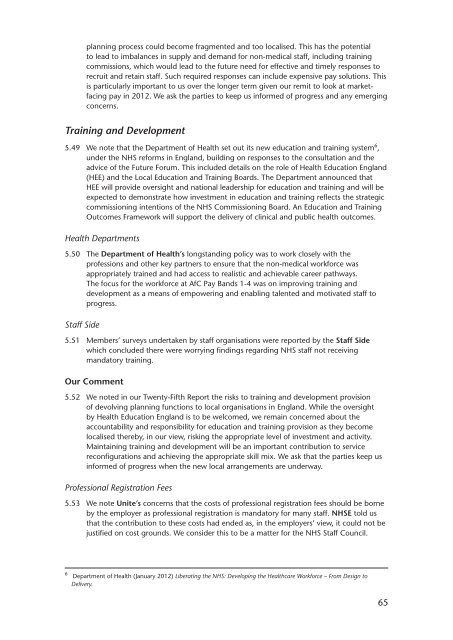NHS pay review body: twenty-sixth report 2012 - Official Documents
NHS pay review body: twenty-sixth report 2012 - Official Documents
NHS pay review body: twenty-sixth report 2012 - Official Documents
You also want an ePaper? Increase the reach of your titles
YUMPU automatically turns print PDFs into web optimized ePapers that Google loves.
planning process could become fragmented and too localised. This has the potential<br />
to lead to imbalances in supply and demand for non-medical staff, including training<br />
commissions, which would lead to the future need for effective and timely responses to<br />
recruit and retain staff. Such required responses can include expensive <strong>pay</strong> solutions. This<br />
is particularly important to us over the longer term given our remit to look at marketfacing<br />
<strong>pay</strong> in <strong>2012</strong>. We ask the parties to keep us informed of progress and any emerging<br />
concerns.<br />
Training and Development<br />
5.49 We note that the Department of Health set out its new education and training system<br />
under the <strong>NHS</strong> reforms in England, building on responses to the consultation and the<br />
advice of the Future Forum. This included details on the role of Health Education England<br />
(HEE) and the Local Education and Training Boards. The Department announced that<br />
HEE will provide oversight and national leadership for education and training and will be<br />
expected to demonstrate how investment in education and training reflects the strategic<br />
commissioning intentions of the <strong>NHS</strong> Commissioning Board. An Education and Training<br />
Outcomes Framework will support the delivery of clinical and public health outcomes.<br />
Health Departments<br />
5.50 The Department of Health’s longstanding policy was to work closely with the<br />
professions and other key partners to ensure that the non-medical workforce was<br />
appropriately trained and had access to realistic and achievable career pathways.<br />
The focus for the workforce at AfC Pay Bands 1-4 was on improving training and<br />
development as a means of empowering and enabling talented and motivated staff to<br />
progress.<br />
Staff Side<br />
5.51 Members’ surveys undertaken by staff organisations were <strong>report</strong>ed by the Staff Side<br />
which concluded there were worrying findings regarding <strong>NHS</strong> staff not receiving<br />
mandatory training.<br />
Our Comment<br />
5.52 We noted in our Twenty-Fifth Report the risks to training and development provision<br />
of devolving planning functions to local organisations in England. While the oversight<br />
by Health Education England is to be welcomed, we remain concerned about the<br />
accountability and responsibility for education and training provision as they become<br />
localised thereby, in our view, risking the appropriate level of investment and activity.<br />
Maintaining training and development will be an important contribution to service<br />
reconfigurations and achieving the appropriate skill mix. We ask that the parties keep us<br />
informed of progress when the new local arrangements are underway.<br />
Professional Registration Fees<br />
5.53 We note Unite’s concerns that the costs of professional registration fees should be borne<br />
by the employer as professional registration is mandatory for many staff. <strong>NHS</strong>E told us<br />
that the contribution to these costs had ended as, in the employers’ view, it could not be<br />
justified on cost grounds. We consider this to be a matter for the <strong>NHS</strong> Staff Council.<br />
6 Department of Health (January <strong>2012</strong>) Liberating the <strong>NHS</strong>: Developing the Healthcare Workforce – From Design to<br />
Delivery.<br />
6 ,<br />
65
















